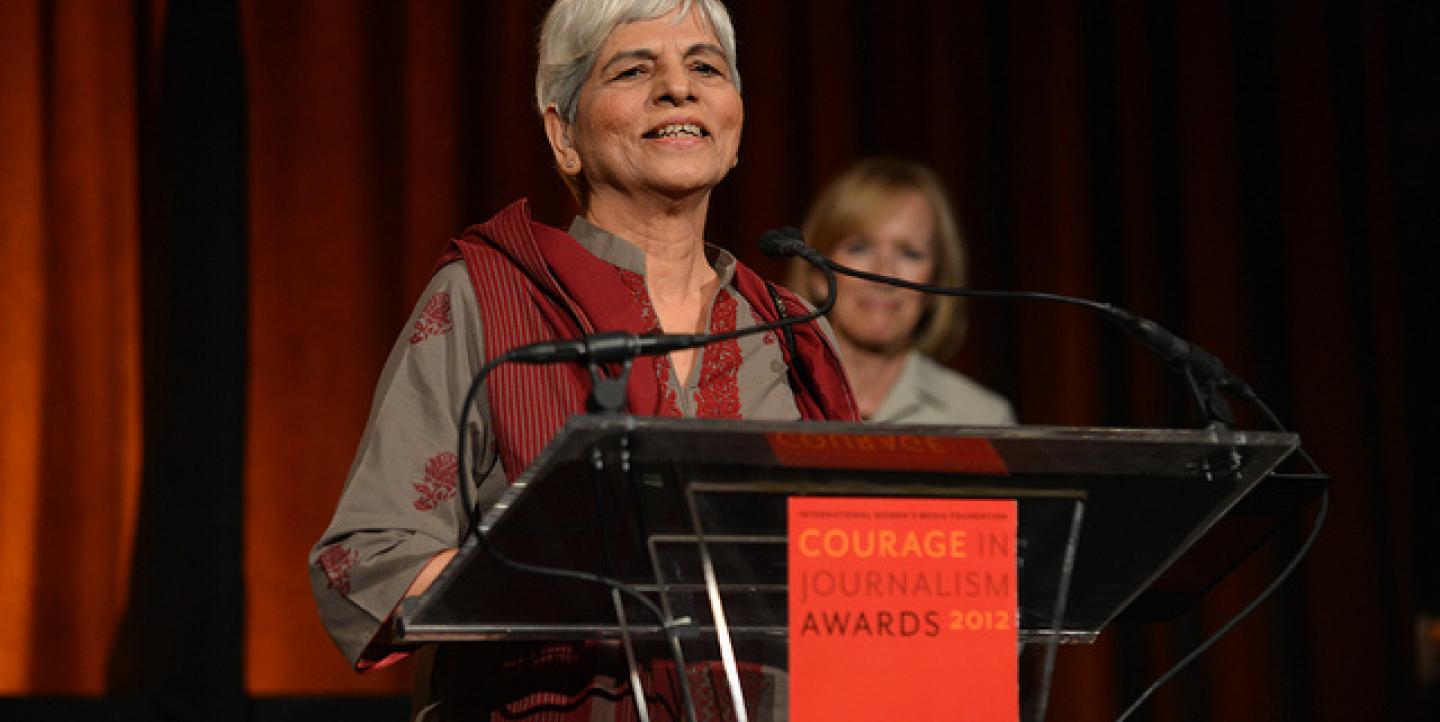When Zubeida Mustafa, the first woman reporter for a mainstream media organization in Pakistan, asked for permission to join then-President Muhammad Zia-ul-Haq's press entourage on a trip, she was told it was strictly a "stag party."
That was just one of many gender barriers Mustafa faced after becoming assistant editor at English-language daily newspaper Dawn in the 1970s. Mustafa, who was recently awarded the 2012 Lifetime Achievement Award by the International Women's Media Foundation (IWMF), was a pioneer in reporting on women’s issues, and also covered politics, education, health and culture.
Mustafa spoke with IJNet about her three-decade journalism career, and present-day challenges faced by women journalists:
IJNet: What inspired you to enter the profession, despite the inevitable roadblocks?
Zubeida Mustafa: Journalism was not my first job. I had already worked as a research officer at a think tank, the Pakistan Institute of International Affairs (PIIA), where I would write research papers on foreign policy. I had taken a break from work when my two daughters were young and needed me. When Dawn offered me a job, I was planning to return to the workplace anyway. I took up Dawn's offer because it promised me flexibility that would allow me to combine my job and family. The writing job was also attractive because that is what I had done before and was confident about. Hence, being the only woman in my office was not such a major challenge, because the ice had been broken in this respect for me when I had joined the think tank along with another female. We provided each other a lot of moral support.
In journalism, the challenge was to establish my credentials and have my work taken seriously. There was no woman at my level at that time in mainstream journalism. They were there, but on the sidelines. I was writing editorials and knew of no woman doing that. As a result, it meant working hard to overcome this gender barrier and to be taken seriously. I managed.
IJNet: A piece you wrote on breast cancer was deemed "obscene" by religious conservatives, and you took on several socially sensitive issues, including rape and contraception. Did you ever feel that you were in danger because of your gender and the content of your work?
ZM: It is difficult for me to identify any story as particularly putting me in danger. I wrote about abortions, contraception and family planning. At that time these issues were taboo. But writing in English for an English-language newspaper protected me. My views reached the policymakers, who were quite liberal in the early-'70s, but didn't cause a public uproar as the cancer story had.
Those who work on the ground are at greater risk because of their visibility. My work [was] aimed at changing people's thoughts, which few people realized then because I was not doing many political stories.
IJNet: How do you think the environment has changed for women news reporters in Pakistan since you began your journalism career?
ZM: The environment is worse in some ways. It is better in the sense that the press laws of the '60s, '70s and the first half of the '80s are no longer there. Those laws could lead to the shutting down of a paper and censorship, or an editor landing in prison. But today there is more violence. Journalists can be--and are--killed if some powerful higher-ups don't like his or her story and feel it will undermine them.
Women journalists face similar pressures as their male colleagues, but apart from the areas where the Taliban are in control, women do not face the social stigma as women of my generation did when we started working in unconventional jobs for women, such as journalism.
Women are deemed to be a danger when they work for change in society. This is a tough job, for change doesn't come easily. It is the activists on the ground who face greater risks because they are working at the grassroots. But journalists have to highlight the need for these changes, This is what I have been doing through out my professional life. That is why I don't claim to be a brave journalist who took on the powerful politicians, but I feel happy that I covered social issues, such as education, health, housing, women's rights, etc., that were not considered the "brave" issues.
These are the issues that affect the poor people--65 percent of Pakistan's population--and not many in the media wanted to touch them. They were not considered important enough. I did, and I am happy that more attention is being paid to them.
Photo courtesy of Stan Honda/International Women's Foundation (IWMF)

